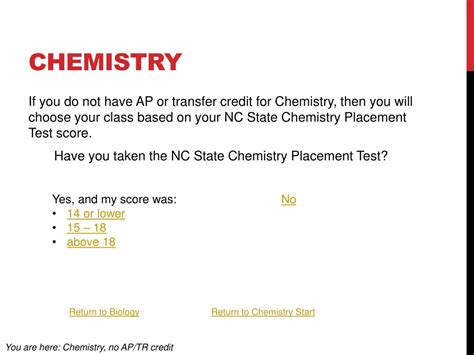Introduction

NC State University utilizes placement exams to assess the academic readiness of incoming students. These exams play a crucial role in determining course placement and ensuring that students have the necessary skills and knowledge to succeed in their academic pursuits. This comprehensive guide will provide all the information you need to prepare for and succeed in your NC State placement exams.
Exam Formats and Content
NC State offers placement exams in five subject areas:
- Mathematics
- English
- Chemistry
- Biology
- Foreign Languages (optional)
The exams are administered online through the University’s testing center. Each exam has a unique format and content, tailored to the specific subject.
Mathematics
- Format: Multiple-choice and open-ended questions
- Content: Arithmetic, algebra, trigonometry, and calculus (for Math 110 and above)
English
- Format: Reading comprehension, writing, and grammar
- Content: Critical thinking, analysis, and writing about academic texts
Chemistry
- Format: Multiple-choice and open-ended questions
- Content: Basic chemistry principles, including atomic structure, bonding, and chemical reactions
Biology
- Format: Multiple-choice and short answer questions
- Content: Biological principles, including cell biology, genetics, and evolution
Foreign Languages
- Format: Oral, written, and listening comprehension
- Content: Fluency and proficiency in the target language
Exemptions and Waivers
Students can earn exemptions or waivers from placement exams in certain cases:
- Exemptions: Students who have earned qualifying scores on standardized tests such as the SAT, ACT, or AP exams can earn exemptions from placement exams.
- Waivers: Students who have completed equivalent coursework at another accredited institution can request a course waiver.
Benefits of Preparing for Placement Exams
Thorough preparation for NC State placement exams offers numerous benefits:
- Accurate Course Placement: Placement exams ensure that students are placed in courses that align with their academic abilities and readiness. This helps prevent students from taking courses that are too difficult or too easy, thereby maximizing their learning potential.
- Reduced Course Load: Students who test out of certain placement exams can skip introductory courses, reducing their overall course load and saving time and money.
- Improved Academic Outcomes: Students who are well-prepared for placement exams are more likely to succeed in their courses and achieve higher grades.
How to Prepare Effectively
Preparation for NC State placement exams is essential for success. Here are some effective strategies:
- Review Course Materials: Review textbooks and class notes from previous math, English, science, and foreign language courses.
- Practice Tests: Take practice tests online or through your high school guidance counselor to familiarize yourself with the exam format and content.
- Seek Tutoring: If you need additional support, consider seeking tutoring from teachers, classmates, or university resources.
- Utilize Study Groups: Collaborate with classmates to study and discuss exam concepts.
- Manage Time: Establish a consistent study schedule and allocate ample time to prepare for each exam.
Common Mistakes to Avoid
- Underestimating the Exam: Do not assume that you can ace the exams without preparation.
- Cramming at the Last Minute: Give yourself ample time to prepare thoroughly.
- Guessing on Answers: If you don’t know an answer, leave it blank instead of guessing.
- Ignoring Practice Tests: Practice tests are invaluable for improving your performance.
- Neglecting Calculation Review: For math exams, ensure you review all necessary formulas and calculations.
Why Placement Exams Matter
NC State placement exams play a pivotal role in student success. By accurately assessing student readiness, these exams ensure that students are placed in courses that challenge them appropriately and support their academic progress. Students who take placement exams seriously and prepare diligently will reap the benefits of optimized course placement, reduced course load, and improved academic outcomes.
Conclusion
NC State placement exams are an essential part of the university’s academic journey. By understanding the exam formats, preparing effectively, and avoiding common pitfalls, you can increase your chances of success and make the most of your educational experience at NC State. Remember, the time and effort you invest in preparing for placement exams will ultimately pay off in the long run.
- NC State University Testing Center
- Placement Exam Information for Incoming Freshmen
- Placement Exam Practice Tests
- Tips for Succeeding on Placement Exams
Appendix
Table 1: NC State Placement Exam Formats and Content
| Subject | Format | Content |
|---|---|---|
| Mathematics | Multiple-choice, open-ended | Arithmetic, algebra, trigonometry, calculus |
| English | Reading comprehension, writing, grammar | Critical thinking, analysis, writing about academic texts |
| Chemistry | Multiple-choice, open-ended | Basic chemistry principles, including atomic structure, bonding, and chemical reactions |
| Biology | Multiple-choice, short answer | Biological principles, including cell biology, genetics, and evolution |
| Foreign Languages | Oral, written, listening comprehension | Fluency and proficiency in the target language |
Table 2: NC State Placement Exam Exemptions and Waivers
| Type | Criteria |
|---|---|
| Exemption | Qualifying scores on SAT, ACT, or AP exams |
| Waiver | Equivalent coursework completed at another accredited institution |
Table 3: Benefits of Preparing for NC State Placement Exams
| Benefit | Explanation |
|---|---|
| Accurate Course Placement | Ensures students are placed in courses that match their academic abilities |
| Reduced Course Load | Allows students to skip introductory courses and save time and money |
| Improved Academic Outcomes | Increases likelihood of success in courses and achieving higher grades |
Table 4: Common Mistakes to Avoid When Preparing for NC State Placement Exams
| Mistake | Explanation |
|---|---|
| Underestimating the Exam | Assuming you can pass without preparation |
| Cramming at the Last Minute | Not giving yourself enough time to prepare thoroughly |
| Guessing on Answers | Leaving blank instead of guessing if you don’t know the answer |
| Ignoring Practice Tests | Ignoring practice tests, which are essential for improving performance |
| Neglecting Calculation Review | Not reviewing all necessary formulas and calculations for math exams |
